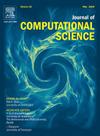Dynamic numerical calculation of multi-physics fields in IGBT chip layer based on ETM-PINN
IF 3.1
3区 计算机科学
Q2 COMPUTER SCIENCE, INTERDISCIPLINARY APPLICATIONS
引用次数: 0
Abstract
The electric-thermal-mechanical (ETM) multi-physics coupling fields commonly exists in power electronic devices such as insulate-gate bipolar transistor (IGBT), which dominates the evolution of key state variables inside the components. Among them, the junction e and electric potential of the chip layer, as the dependent variables of various lifetime physical models, directly affect its remaining service life and health status. Aiming at the problem that the key physical variables inside the IGBT are difficult to monitor and predict, this paper first integrates and establishes the ETM coupling partial differential equations (PDEs) inside the IGBT, then accordingly proposes an accurate numerical calculation method for coupled physical fields based on ETM-physics-informed neural networks (ETM-PINN).Through relevant simulation verification, it can not only realize the numerical calculation of the chip layer junction temperature and electric potential field without data, but also perform multi-physics predictive calculation with reduced accuracy in the absence of the key coefficients in PDEs. In the presence of additional physical field data, it can also perform data-model fusion calculations to further improve the solution accuracy.
基于 ETM-PINN 的 IGBT 芯片层多物理场动态数值计算
绝缘栅双极晶体管(IGBT)等电力电子器件中普遍存在电-热-机(ETM)多物理耦合场,主导着元件内部关键状态变量的演化。其中,芯片层的结电子和电动势作为各种寿命物理模型的因变量,直接影响其剩余使用寿命和健康状况。针对 IGBT 内部关键物理变量难以监测和预测的问题,本文首先整合并建立了 IGBT 内部的 ETM 耦合偏微分方程(PDE),并据此提出了一种基于 ETM 物理信息神经网络(ETM-PINN)的耦合物理场精确数值计算方法。通过相关的仿真验证,该方法不仅可以在没有数据的情况下实现芯片层结温和电动势场的数值计算,还可以在没有 PDE 关键系数的情况下进行精度降低的多物理场预测计算。在有额外物理场数据的情况下,它还能进行数据模型融合计算,进一步提高求解精度。
本文章由计算机程序翻译,如有差异,请以英文原文为准。
求助全文
约1分钟内获得全文
求助全文
来源期刊

Journal of Computational Science
COMPUTER SCIENCE, INTERDISCIPLINARY APPLICATIONS-COMPUTER SCIENCE, THEORY & METHODS
CiteScore
5.50
自引率
3.00%
发文量
227
审稿时长
41 days
期刊介绍:
Computational Science is a rapidly growing multi- and interdisciplinary field that uses advanced computing and data analysis to understand and solve complex problems. It has reached a level of predictive capability that now firmly complements the traditional pillars of experimentation and theory.
The recent advances in experimental techniques such as detectors, on-line sensor networks and high-resolution imaging techniques, have opened up new windows into physical and biological processes at many levels of detail. The resulting data explosion allows for detailed data driven modeling and simulation.
This new discipline in science combines computational thinking, modern computational methods, devices and collateral technologies to address problems far beyond the scope of traditional numerical methods.
Computational science typically unifies three distinct elements:
• Modeling, Algorithms and Simulations (e.g. numerical and non-numerical, discrete and continuous);
• Software developed to solve science (e.g., biological, physical, and social), engineering, medicine, and humanities problems;
• Computer and information science that develops and optimizes the advanced system hardware, software, networking, and data management components (e.g. problem solving environments).
 求助内容:
求助内容: 应助结果提醒方式:
应助结果提醒方式:


